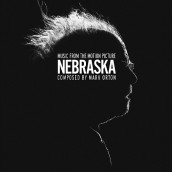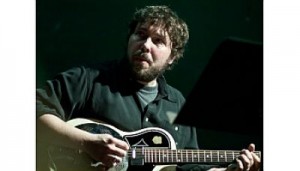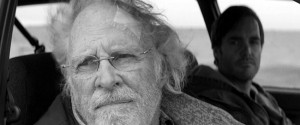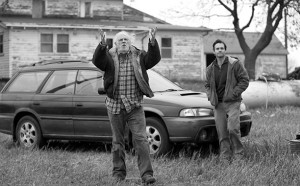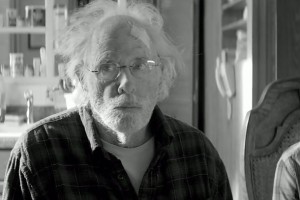From ABOUT SCHMIDT‘s gruff retiree venturing about the Midwest in his Winnebago to the two malcontents who take their beat up car for soul-searching and wine-tasting in SIDEWAYS‘ Santa Ynez Valley, filmmaker Alexander Payne has proven that he’s got an eccentric taste for movies involving road trips with bastards – especially when it comes to the eccentric scores playing on his car radio called a soundtrack.
But of all the hopefully redemptive voyages for these lovable losers that Payne has staged to critical acclaim, perhaps none has the desolate whimsy we hear on our way to NEBRASKA. The state might as well be Willie Wonka’s Chocolate Factory for the addled mind of the barely audible retiree Woody Grant (Bruce Dern), who thinks a magazine office holds the million dollars its promised him via the junk mail he so desperately grasps. Knowing far better is his hapless son David (Will Forte), who sees humoring his dad as a way to get closer to him before the old man completely drifts away into his own world. But before their misadventures land them in the state capital of Lincoln, the duo make an elongated pit stop with Woody’s family and “friends,” all of whom are so far gone in their own squashed hopes that they see Woody as a celebrity whom they can take advantage of.
Easily the most beautifully stark, black and white-shot exercise in redemptive depression that Payne has made NEBRASKA abounds with a bitingly dry sense of yokel local humor and poignant remembrance – a poetic sense of whimsy that’s beautifully conveyed in the ersatz western bluegrass score of the Tin Hat-wearing Mark Orton. Sounding far more like a score depicting a cowboy loping across the Rio Grande on his way to the last round up, only to encounter one obstacle after the next, NEBRASKA is full of thematically spare, beautifully oddball magic. Much like those who can only respond to this Don Quixote-esque mechanic who’s more than a few gears short, Orton’s strumming, stripped down approach for strings, Zydeco rhythms, harmonica, horns and a farmhouse full of other rural favorites smiles with sweet sympathy at Woody – matching Payne’s alternately understanding, and satiric tone at the flyover people who actually represent a good chunk of non-celebrity looking America, especially in their dreams of achieving far bigger things in lives destined to stay put.
Not that Mark Orton remains stuck in a skewed country-western landscape, as his membership in the San Francisco-based Tin Hat has encompassed experimental music as well as folk, inviting along such guest artists as Tom Waits and Willie Nelson to sit in on a trio that’s now grown into a quartet. Tin Hat’s ear-catching folksiness first landed Orton as a composer for the darkly comic rural doings of 2002s THE GOOD GIRL. Since then Orton’s songs have ended up in EVERYTHING IS ILLUMINATED and BUCK, while the musician has demonstrated abilities to range outside country-centric borders with ORTHODOX STANCE, THE LOSS OF A TEARDROP DIAMOND and THE REVISIONARIES. But while Orton might also be capable of hearing techno and Celtic landscapes, it’s the western surroundings of simple folk that bring out his best melodic poetry for NEBRASKA. It’s a score, and film that aren’t so much a place as a they are a whimsically rural state of mind, conveyed with elegant simplicity by a composer who manages to wear many emotional hats on Alexander Payne’s empathetic trip to nowhere in particular – but everywhere indeed when it comes the director’s sad sacks discovering they are men of real worth.
When did your own love of country bluegrass begin?
I grew up listening to a really wide range of music. My father is a conductor and i would hang around his orchestral and choral rehearsals. He’s into Charles Ives and Aaron Copland and was always interested in early American music. My brother was 7 years older than me and turned me on to his generation’s classic rock music (Led Zeppelin, The Beatles, etc.) – at the same time i was taking music lessons. I had started studying piano when i was 3, and guitar when I was 5. With guitar as my main instrument I was playing folk music. That, and my mom’s Patsy Cline records were probably my first exposure to country/bluegrass/Americana. I picked up banjo and mandolin along the way, and later Dobro as well. All of these instruments have roots in Americana music. My love of it began kind of organically through both playing and listening to it. Later on in college, I got in much deeper, and started collecting instruments from the extended bluegrass/Americana palette (Marxophone, autoharp, ukelin, banjo-bass, etc.) at the same time i was writing orchestral music
ASSIGNMENT X: Did you ever imagine yourself as a film composer as you were playing in Tin Hat? And did you ever look into the past of country-bluegrass while developing your own sound?
MARK ORTON: I started studying composition when I was in high school. I grew up in stony brook and there was a great composition teacher there named Danny Deutsch who started kids writing really early (Marco Beltrami also studied with him). Danny was as into Elliott Carter and Gyorgy Ligeti as well as Jimmy Hendrix and Charles Mingus. I went on to study composition at the Hartt School of Music and the Peabody Conservatory. I wrote scores for a few animated shorts while in school and worked scoring other visual mediums (dance, theater) as well as avant radio dramas. In my first years out of school i worked on a few more indie short-films
Tin Hat’s music was always licensed into films. Over time my manager worked me into sweetening and scoring gigs based on the Tin Hat material, Later, I started writing full scores. In the beginning, the sound directors were looking for from me had very much to do with Tin Hat. So I came into this rather organically – not by apprenticing or going to school for film-composition. I did always imagine that i would write for film. It’s something i was always drawn towards – and I feel lucky that by and large I’ve been able to do it on my own terms.
Tin Hat’s sound was more about friendship than a mission statement or research. We had all known each other since we were kids and had grown up with the same sort of wildly eclectic tastes. We had all studied classical music but were all improvisers as well. We listened to Smithsonian records, Thelonious Monk, Charles Xenakis, and Willie Nelson. We were a composer’s collective and the only thing we had decided about the group early on was that we would stick to an acoustic instrumentation and use extended techniques and preparations rather than anything electric or processed. Whatever of bluegrass’s past that found its way into my/our sound did so naturally.
AX: THE GOOD GIRL was your first major score. What was the experience like, and how do you think it set you on the path for scoring rural-centric movies?
ORTON: The director Miguel Arteta and I had mutual friends (one of whom was a director i had written a score for) and he knew Tin Hat. I was brought on after roughly half the score had been written and they were looking for someone to finish it. I was an engineer at the Knitting Factory in New York City at the time and in fact used their console to mix the sessions. Tin Hat trio members Rob Burger and Carla Kihlstedt both played on the cues. The palette was kind of extended Tin Hat with real strings and chamber orchestration. It was in the days before pro tools. So I hit play on the VHS and recorded on my da-88’s!
AX: How did you become a part of NEBRASKA?
ORTON: I found out early on that some of my music was in the temp score of an early cut of NEBRASKA when music editor Richard Ford reached out to ask me to send him material. I sent him a variety of stuff: Tin Hat, feature score cues, doc score cues and library material. At the end of our back and forth, 27 of the temp score’s 28 cues were my music, the 28th was from Tin Hat trio member Rob Burger. I was then asked to sweeten the material for the premiere of NEBRASKA at the Cannes Film Festival. A couple string and wind sessions along with accordion and flugelhorn followed. Richard and Alexander came up to Portland for them, and i mixed it all at my studio, where i mix most of my material. After the success at Cannes, I was asked to come on board as composer. The score ended up as a conglomeration of sweetened licensed material and original music.
AX: How did the music for SWEET LAND play a role in NEBRASKA?
ORTON: Two of the themes from SWEET LAND are used in NEBRASKA as two of its main themes. Alexander was really drawn to that material, which is fairly spare – guitar, violin, pump organ, Dobro, Autoharp form the core. The opening theme is one of the first cues I ever recorded with my (now) wife. It’s how we met. We always talk about how “love was in the air…” She’s a violinist I hired to play on soundtracks and has both a classical and a fiddling background. Needless to say, she was paid better back then.
AX: How do you think the score represents the isolation of the landscape?
ORTON: I think keeping it a spare acoustic instrumentation helps in this regard – much of the score is just a handful of instruments playing at any one time. But I think the score has as much to do with reflecting the characters as the landscape.
AX: How would you describe Alexander Payne’s approach to music, and what was your collaboration like?
ORTON: Alexander is a musician himself, and is very much involved with the score and its role in the film. For NEBRASKA his idea was to keep the soundtrack from being overtly country/western, instead imagining a kind of Italian cinema on the plains. It’s why the accordion is featured so heavily. He’s very hands-on when something is in process, even singing melodic fragments occasionally. Alexander is definitive in his tastes for what does and doesn’t work in a scene.
AX: Alexander’s films have a particularly dry sense of humor. How do you think your music complemented that here? Were you ever worried about the score condescending to the vision that more “sophisticated” audiences might have of local yokels?
ORTON: I’d like to think that my music often has a similarly dry sense of humor – and that what humor there is lies below the surface. I didn’t look to underscore the humor in the film in any overt way – the script takes care of it. As far as the idea that the score is condescending to the yokels, I don’t see it as particularly dumbed down – it’s just consciously spare. But there’s strummed piano, celesta, harp, toy piano, reed organ, strings, accordion, Stroh Violin, and trumpet in the first 1/2 dozen cues – it’s not a fiddle and banjo score or DELIVERANCE revisited (not that there’s anything wrong with that score!) Regardless, I think something bigger would have taken you out of picture and away from the intimacy of the family’s story.
AX: For all of its subtlety, NEBRASKA is a surprisingly thematic score. Could you talk about your motifs here?
ORTON: I’m a thematic composer first. It’s been the last bunch of years and a stint at the Sundance Institute that has gotten me into the power of themeless film music. Coming out of a career as a composer writing very thematic concert music, this was an early challenge for me. As out there, or dissonant as Tin Hat ever got in terms of free improv or our more experimental side, the melodies were always strong. But in the case of NEBRASKA something like 24 of the 28 score moments are simply image and music with no dialogue. So there was plenty of room for themes. Again, that was the side of my writing that Alexander was drawn to. The themes in NEBRASKA are song-like. They certainly are on the lyrical side of my writing.
AX: If you close your eyes, you could easily imagine NEBRASKA as a score for a western. Was that ever the intention?
ORTON: It wasn’t, although i can see how certain score elements bring you there. I’d lean on the bass harmonica in places – plus the Dobro and the Stroh violin – but again Alexander was looking for something less referential. If I had come in with either an Ennio Morricone western sound or Ry Cooder PARIS, TEXAS-esque material, it wouldn’t have flown.
AX: How did you want to balance more “rural” instruments like the guitar and harmonica with ones you might not expect from the genre, like the piano, trumpet and bell percussion?
ORTON: There were certain pieces of mine that were licensed into the film that touched on those instruments so we had a starting point instrumentation-wise. I think their addition helps bring the score away from any genre, which was part of the goal here. We were never going for overt references – nothing too on the nose – and the story isn’t just about country or rural life. It’s a universal story of aging and memory within a family. The main characters are a mechanic, a hi-fi salesmen, a beautician and a TV news anchor. They’re once or twice removed from farmers and the more classic rural characters. It’s true that they are traveling through the heartland and exploring their rural roots. So the landscape and towns we see are part and parcel of that. But my hope is that the score reflects all of this rather than just the country side of things.
AX: Were the sessions for NEBRASKA more like playing with your band than scoring a film?
ORTON: I wouldn’t say so. It’s not like i had a kind of carte blanche to jam along with picture and see what happened. Our music editor and score producer Richard ford and I had a real clear sense going into the scoring sessions what was happening when, and how. But that being said, I did rely on Rob and Carla’s natural abilities. We’ve been working together for over 20 years, and have been friends since we were children. They’re both fantastic improvisers so even though notes are on the page, I try to leave some room to take advantage of their skills. In general, I’d say I’m more drawn to this kind of music making when possible.
AX: Did you ever take any road trips that inspired you for this score?
ORTON: I toured as an engineer both nationally and internationally for years mixing for musicians like Bill Frisell, The Lounge Lizards and Mr. Bungle. Then Tin Hat got signed and i began touring again with my own group. I’ve driven out 3 cars to over 300,000 miles. I write when i travel, and have a simple mobile rig that’s battery powered. I have a kind of singing shorthand that I use so it’s hands-free. So I’d say road trips have always been inspirational for me. I still will hit the road to clear my head and work on material, though in Portland that’s more often on my bike these days.
AX: Do you think the score’s relatively simple approach makes the movie more emotional?
ORTON: I think that the simpler approach does help you connect to the characters and stay with them, Maybe that helps connect to what they’re going through emotionally.
AX: Were you ever worried about the score being too much of a downer, especially given the depressing subject matter of people trapped in dead-end lives?
ORTON: I guess i don’t see it that way. I think of this as a redemptive film, and a film about what the loss of memory and aging means to the younger generation. There’s also David’s slow realization of who his father really is, as seen through the eyes of his old “friends” and Woody’s hometown. The character’s quixotic quest is just the vehicle for those realizations.
AX: With Woody only talking whenever he has to, how important was it for your music to reflect the “buried” good guy that might lie underneath his bluster? And what do you think the score says about having an impossible dream that everyone else laughs at your for?
ORTON: I hope that the score starts neutral and takes on emotion as the film progresses. I think that’s the advantage of having gone with a more thematic score, as the return of a theme means something different as the characters develop. I think there’s also an innocence in parts of the score that works well with Woody’s dementia-sponsored childlike moments. But at the same time it’s hopeful. With all of that said, I think letting the brilliant script, acting, and directing work for themselves is what made the best sense – rather than emotionally leading anyone with score.
AX: How long do you think you’d last on a road trip with Woody?
ORTON: I’ve toured with worse. My Spanish driver on Tin Hat’s first Blue Note tour makes Woody seem like a sweetheart.
Buy Mark Orton’s score to “Nebraska” HERE
Visit Mark Orton’s website HERE
AGREE? DISAGREE? LET YOUR VOICE BE HEARD – COMMENT BELOW
Follow us on Twitter at ASSIGNMENT X
Fan us on Facebook at ASSIGNMENT X
Article Source: Assignment X
Article: Interview with NEBRASKA composer Mark Orton
Related Posts:




